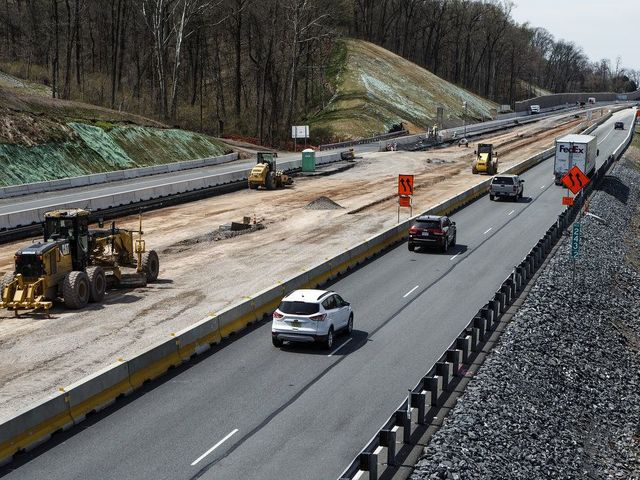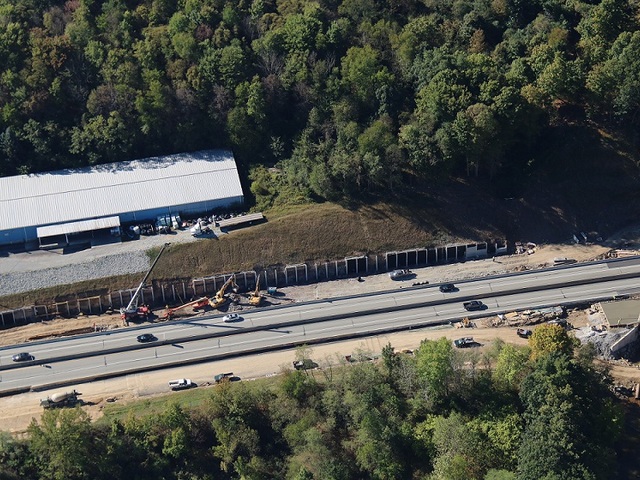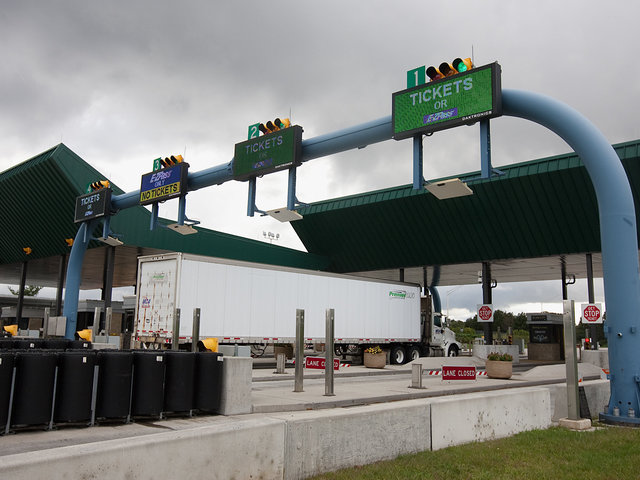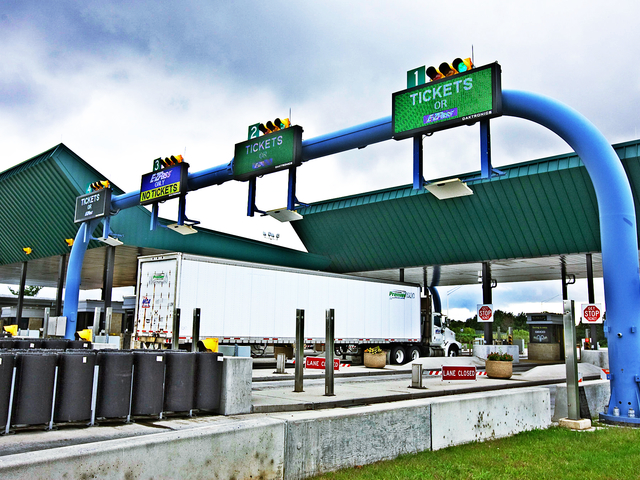- Funding Needed
- $1,751 (Mio)
- EB5 Funding
- $800 (Mio)
- Amount Subscribed
- $951 (Mio)
- EB-5 Investors
- 445
- Investment Amount
- $1,800,000
- Subscription Fee
- 60,000+
- Job Creation per Investor
- 52.1
- Job Creation (Total)
- 23170
- Category
- Construction
- Sub-Category
- Highway, Street, and Bridge Construction
- Structure
- Loan
- Amount of EB-5 investors anticipated for this phase?
- 1600 total investors can subscribe to this project.
- Expected Maturity
- The term of the EB-5 loan is 5 years.
- Expected Return
- Investors can expect about 0.25% per annum of tax free interest once the loan is made to Pennsylvania Turnpike.
- Does this project have approved I-526's?
- Yes
- Does this Regional Center have approved I-526's?
- Yes
- Does this Regional Center have approved I-829's?
- No
- State
- Pennsylvania
- Location
- Pennysylvania
- Last Update: February 05, 2021 11:12 AM
Funding
Jobs
Investment
Immigration
Location
Your Project was viewed 688 times (totally).
For the last 7 days 0 times.
Pennsylvania Turnpike Highway Capital
- Developer Name
- Pennsylvania Turnpike Commission
Project Description
The PTC Highway Capital Project is a system-wide total reconstruction initiative that entails rebuilding sections of the 60-plus-year-old Pennsylvania Turnpike’s highways from the ground up, which includes constructing new interchanges and widening and reconstructing existing highways. The entire initiative, once completed, will improve safety and provide a more efficient flow of traffic for Turnpike travelers. Full-depth reconstruction involves removing all original pavement and sub-base and replacing it with an entirely new roadway. The existing, four-lane highway will be replaced with a six-lane highway that has full, 12-foot-wide shoulders to the left and right of the travel lanes. All other facets of the highway will also be replaced including lighting, barriers and guide rail, noise barriers and retention walls, and drainage systems. To accommodate the construction, certain overhead bridges and tunnels will also be replaced and new toll facilities built as necessary.
Project Timeline
Project construction will occur for at least 5 years.
Conversations
Information Needed
Reports
Pennsylvania Turnpike Highway Capital: Contact Information
- Contact Person
- Frank Manheim
- Address (contact)
- 200 West Washington Sq, Suite 250, Philadelphia, PA 19106
- help@thedvrc.com
- Web Site
- www.thedvrc.com
Project Management
| First Name | Last Name | Title |
|---|---|---|
| Frank | Manheim | Director |
| Jing | Han | Senior Associate |
| Derek | Chen | Senior Associate |
Pennsylvania Turnpike Highway Capital: Investments
- Reg. D?
- Yes
- Reg. S?
- Yes
- Investment type
- Loan
- Total amount of estimated funding required for all phases of development(in Millions)?
- 1751
- Number of planned phases (projects) in development?
- 1
- Expected time to complete this project or phase of overall development?
- more than 12 months
- Is this a new commercial enterprise or purchase of an existing troubled business?
- New commercial enterprise
- What ratio of equity to debt would best classify the source of overall funding for the project / development?
- 50% equity : 50% debt
- What percentage of overall funding has been raised to date?
- 50% - 75%
- Does the investor need to be accredited to invest?
- Yes
- What are the expected financial returns for this project?
- Investors can expect about 0.25% per annum of tax free interest once the loan is made to Pennsylvania Turnpike.
- On what premise are those projections made?
- Tax-free interest received from loan to Pennsylvania Turnpike Commission (PTC).
- Are returns paid on the investment prior to maturity?
- Yes
- If Yes, when are they paid?
- Annually
- Can you describe in more detail how returns are paid, and under what conditions? For instance, are they only paid if the project is positive cash flow or profitable. What expenses must be accounted for and paid prior to distributions are paid to investors?
- Distributions will be paid provided that sufficient funds are available. After giving effect to certain special tax related allocations, profits and losses for any fiscal year will be allocated among the Partners on a class by class basis. 75% shall be allocated to the General Partner and 25% to the Limited Partners. The distribution limited partners receive every year is distributed as per the LP Agreement after deducting all L.P. expenses.
- Can you please describe the expected exit strategy and what source(s) of debt or equity are expected to be used to repay the investor’s capital investment?
- At the end of five years, the Borrower will have the option to either repay the loan in cash or to deliver tax free municipal bonds to NCE. There is no guarantee that such repayment will occur on acceptable terms, if at all.
- Can you please describe the procedure for allowing the investor to sell his interest in the investment and who the buyer might be?
- Investors are limited from directly selling their LP interest as described in the limited partnership agreement.
- What is the expected term of the investment?
- The term of the EB-5 loan is 5 years.
- Can you describe what procedures are in place If the investor needs to liquidate his position before the contracted maturity date of the agreement, and what penalties may be imposed?
- Investor's request to return the capital is subject to be reviewed by the General Partner on a case-by-case basis. Generally speaking, investors do not have the right to demand the withdrawal of capital unless relevant conditions have been made. Details please see Limited Partnership Agreement
- Have these strategies been used by the Regional Center principals, or project managers in the past and what was the outcome?
- Structure is identical to our previous Pennsylvania Turnpike I95 Interchange Project.
- Have all of the permits and permissions for project development been obtained?
- Yes
- Is there any patented intellectual property essential to this project?
- No
- Are there any other notes or comments to make regarding this investment that would be important for the Investor to know?
- EB-5 Project Highlights: Project owned, operated, and will be constructed by Pennsylvania Turnpike Commission, a state government agency responsible for financing, constructing, and maintaining toll highways in Pennsylvania. EB-5 loan is senior secured by Pennsylvania Turnpike Commission’s annual toll revenues of over $1 billion USD. Pennsylvania Turnpike Commission’s debt is rated A by all major credit rating agencies. PTCII Project has received I-924 Exemplar Approval. As of May 1, 2020, PTC II Project has received 114 I-526 approvals. * *Please note, the I-526 approval number is a historic data, it is not a guarantee or prediction for future I-526 approvals.
Pennsylvania Turnpike Highway Capital: Fees
- What is the fee for subscribing to the investment (Subscription Fee)?
- 60,000+
- Do potential investors need to pay a fee to obtain the operating documents, PPM or other subscription documents?
- No
- If Yes, Is that refundable in the event the investor decides not to invest?
- No
- If so, what is that Document fee?
- No Document fee.
- Could you please describe the procedure for the return of any fees, or fees that are withheld?
- There are no fees associated with viewing documents, but we require investor questionnaire and identification.
- Could you please describe the procedure for return of escrow in the event of denial of the I-526 by USCIS?
- Full repayment of investment by PTC is available if I-526 is denied. Detailed see offering documents.
- Does that include the processing of the I-526, I-829 or any other legal fees associated with the immigration application?
- No
- What is required for escrow payment at the time of submission of the I-526?
- Entire investment and subscription fee.
- What is the policy for reimbursing the escrow payment in the event of denial?
- Full repayment of investment by PTC is available if I-526 is denied. Detailed see offering documents.
- What fees do you pay to 'finders' or agents?
- We pay marketing fees to agents providing there is no tie to U.S.
- If there is no finder or agent, would you reimburse that fee to the investor?
- No
- What would be the procedure for reimbursing this fee?
- Please inquire directly.
- Do you pay finder’s fees to attorneys?
- No
- Do you pay fees to unlicensed broker’s or agents?
- No
Pennsylvania Turnpike Highway Capital: Risks
Risk Factors
| Risk Factor | Description |
|---|---|
| The Pennsylvania Turnpike Commission’s revenues may decline. | The actual amount of future toll revenues collected by the PTC depends upon a number of factors, including rates established by the PTC and the level and composition of traffic on its system. Many of these factors are beyond the control of the PTC. The PTC is obligated under the terms of various financing documents to fix and revise tolls at levels that will generate revenues (together with other available moneys) sufficient to pay all of its obligations under the Funding Agreement for the Loan, to construct and maintain its system, and to pay debt service obligations and other amounts payable to the Pennsylvania Department of Transportation or the Commonwealth of Pennsylvania. However, the amount of traffic on the system cannot be predicted with certainty and could decline due to general economic conditions, diversion of some traffic to alternative non-toll routes to avoid toll rate increases or because of increased fuel costs, increased mileage standards, higher fuel taxes, or other factors. There is insufficient data to assess these risk factors fully. However, based on historical variations in such factors and the recent toll increases, we expect that the PTC will have sufficient revenues to meet its payment obligations, including payment obligations with respect to the Loan. |
| If the Pennsylvania Turnpike Commission experiences financial problems, delays in payment or losses on the Loan may result. | Adverse changes in the PTC’s financial condition could result in a failure to make its payments, or a delay in payments, to the Partnership with respect to the Loan. In addition to a potential decline in revenues, the PTC’s financial condition could be adversely affected by a number of factors that include: • increased and/or unanticipated costs of operation and maintenance of the system; • decreased toll revenues due to declines in usage or otherwise; • work stoppage, slowdown or action by unionized employees; • growth in and improvements to competing mass transit systems; • complete or partial destruction or temporary closure of the system due to events beyond the control of the PTC; • increased unfunded pension benefits; and • increased unfunded healthcare and other non-pension post-employment benefits. |
| The financial condition of the Pennsylvania Turnpike Commission may be adversely affected as a consequence of adverse changes in the financial condition of third party financial institutions. | Adverse changes in the financial condition of certain third party financial institutions may adversely affect the PTC’s financial position. Different types of investment and contractual arrangements may create exposure for the PTC to such institutions including: • risk to the PTC’s investment portfolio due to defaults or changes in market valuation of the debt securities of such institutions; • counterparty risk related to swaps used by the PTC to hedge its cost of funds; and • risk of rating changes of the PTC’s credit enhancers or liquidity providers that may adversely affect the interest costs on the PTC’s variable rate debt or that may render such variable rate debt unmarketable. |
| The EB-5 Program is a U.S. government program that is highly regulated and requires frequent interaction between the Partnership and government officials. | The EB-5 Program was created in 1990 by the U.S. Congress, which has accorded broad regulatory powers to the Department of Homeland Security and in particular to the USCIS in administering the EB-5 Program. The regional center program (previously called a “pilot” program) was first created in 1992. Any changes to a regional center’s scope including geographic area, industry, economic methodology, or any other type of material deviation from the original designation application requires the filing of an amendment application with USCIS. While we will strive to coordinate with USCIS to achieve our investors’ immigration goals, we cannot assure you that USCIS employees will take a consistent position on many of the issues arising under the EB-5 Program, and we cannot assure you that USCIS regulations, precedent case law, and policies will not change in the future. Because the laws, regulations, and USCIS interpretations applicable to our investments are subject to change at any time, we cannot assure you that we will not be required to substantially change our investment policies in the future. |
| The EB-5 Program and other immigration laws can be discontinued or changed at any time and may adversely affect the EB-5 immigrant investor. | The U.S. Congress and/or other government agencies may discontinue or change some provisions of or the entire EB-5 Program. Changes to and/or elimination of the EB-5 Program in its entirety may adversely affect the investors. The EB-5 Regional Center Program is set to expire on April 28, 2017. We cannot assure you that the EB-5 Regional Center Program will be renewed or extended beyond April 28, 2017, or that the U.S. Congress will allocate sufficient immigrant visas for the EB-5 Program to provide visas for all investors who subscribe to this offering. In addition, the USCIS may cease to give deference in the future to state designation letters with respect to geographical areas classified as Targeted Employment Areas. In addition, should any amounts be paid by the Partnership or by the General Partner on behalf of the Partnership to a third party in relation to marketing and syndication expenses which has not been reimbursed to the General Partner or the Partnership following a termination of the EB-5 Program prior to investor’s I-526 approval or following a denial of an investor’s I-526 application, any amounts which would otherwise be reimbursed to investors shall be reduced by such amounts, thereby resulting in an adverse financial consequences to such investors. |
| EB-5 visas are allocated by the U.S. Department of State on a first come first served basis based on the date an investor’s I-526 petition is filed with the USCIS. | Currently, 10,000 fifth preference immigrant visa numbers are allocated annually to alien investors, their spouses, and qualifying children. EB-5 visas are allocated by the U.S. Department of State on a first come first served basis based on the date an investor’s I-526 petition is filed with the USCIS. If more visas are sought than are available, a delay in the processing of an investor’s immigrant visa or adjustment of status to permanent residence could occur. We cannot predict the exact length of time an investor could wait until such a visa becomes available. Any unexpected delay could negatively affect the ability of investors under this offering to receive EB-5 visas and could also negatively affect the ability of the investor’s children who are nearing the age of 21 to obtain an immigrant visa. |
| As a Limited Partner, you will be subjected to certain general immigration risks faced by all immigrants to the U.S. | The process of obtaining conditional resident status and permanent resident status involves many factors and circumstances that are not within our control. These include the investor’s past history, history of alcohol and drug use, criminal history, past membership or association with certain political, social, or religious groups, immigration visa backlogs, potential changes in immigration laws and regulations (including laws and regulations specific to the EB-5 Program), and quotas established by the U.S. government limiting the number of immigrant visas available to qualified individuals seeking permanent resident status under the EB-5 Program. Although the Partnership has been structured with the objective of providing Limited Partners with eligibility for conditional and permanent resident status under the EB-5 Regional Center provisions of the U.S. immigration laws, we cannot assure you that you will obtain approval of your particular immigrant application. Purchase of Units does not guarantee conditional resident status or permanent resident status in the U.S. Furthermore, we cannot assure you that conditional resident status, if granted, will be converted to permanent resident status. |
| Investment is only a part of the EB-5 Program requirement. In addition, the USCIS will require that you pass a background check. | According to USCIS policy, no application for lawful permanent residence will be approved until a definitive FBI fingerprint check and Interagency Border Inspection Services (IBIS) check are completed and resolved favorably. An EB-5 immigrant investor’s background (or that of an immediate family member) may not meet the USCIS criteria for conditional or permanent residency in the U.S. For example, among other criteria, the following may be grounds for denial of immigration benefits for the immigrant, and/or other members of the immigrant’s family: having a communicable disease or other dangerous contagious disease; having been at any time involved with, trafficking in, or taking, illegal drugs; having been convicted of certain crimes; having committed fraud or misrepresentation to a U.S. government official; or having violated U.S. immigration laws in the past. If an investor receives conditional lawful permanent resident status but later does not receive lawful permanent resident status, we have no obligation to refund any of the investor’s purchase price, including the subscription fee, or otherwise redeem the investor’s Interest. Other security checks could be required by the USCIS, Department of State, or other governmental agencies, which could delay adjudication of the I-526 Petition or the subsequent application for an immigrant visa or conditional lawful permanent resident status. |
| The EB-5 Program requires that an immigrant investor’s source of funds be lawful and traceable. | EB-5 immigrant investors must demonstrate to the USCIS that the funds invested in the Partnership were obtained through lawful means. Likewise, each EB-5 immigrant investor must document to the satisfaction of the USCIS, the source of these funds, whether earned through income, sale of real estate, sale of stock, gift, loan, divorce settlement, etc. The investor must to the best of his or her ability trace the funds from the time they were earned through the time they were invested in the Partnership. The USCIS will retain ultimate authority in deciding whether the investor has met his or her burden of proof with respect to tracing and demonstrating the lawful source of the investment funds. Before executing the subscription agreement, the EB-5 immigrant investor must be prepared to present to the General Partner all documents relevant to the lawful source of funds and tracing of these funds. |
| Achieving your immigration goal of conditional and lawful permanent resident status will require you to comply with U.S. immigration residency requirements. | EB-5 immigrant investors who obtain conditional or lawful permanent resident status must intend to make the U.S. their primary residence. Lawful permanent residents who maintain their primary residence outside the U.S. risk revocation of their U.S. residence status. Each prospective EB-5 immigrant investor should consult a competent immigration attorney to review the likelihood that the investor’s immigration objectives will be achieved. The Partnership has to work with the PTC Project to meet the job creation and retention requirements of the EB-5 program to ensure that sufficient jobs are created when our investors file for the removal of the condition of their permanent residency. If an investor fails to obtain or later loses his or her lawful permanent resident status due to his or her failure to comply with the residency requirements under U.S. immigration law, we have no obligation to refund any of the investor’s capital contributions and the subscription fee. |
| In general, the issuance of 10,000 visas in any one or more years under the EB-5 Program could create a backlog in the EB-5 immigrant visa category. | Approximately 10,000 visas are available each year in the EB-5 immigrant visa category. Before 2012, the U.S. Department of State had not issued more than 4,218 visas in any year since the EB-5 category’s creation in 1990. However, the EB-5 Program has recently experienced an increase in usage. The U.S. Department of State issued 8,564 visas to EB-5 investors in the fiscal year 2013 and 10,692 visas to EB-5 investors in the fiscal year 2014. The issuance of 10,000 visas in any one or more years could create a backlog in the EB-5 category, which could result in a qualified investor not receiving his or her conditional green card until a visa becomes available. This holdup could in turn delay (a) an investor’s entry to the U.S. if the investor is consular processing or (b) the filing of the investor’s adjustment of status application if the investor is already in the United States. In addition, the delay could result in children of the investor turning 21 before visas become available, making them ineligible to apply for immigrant visas or adjustment of status as derivative beneficiaries of the investor. Such children would be required to apply for their own immigrant visas as the principal applicant, on the basis of either their own EB-5 petition or another immigrant category for which they may qualify. Visa backlogs that delay an investor’s receipt of a conditional green card will also delay the filing of his or her I-829 Petition, which could negatively affect the investor’s ability to prove requisite job creation and remove the conditions to permanent residency. |
| Resale or transfer of the Units will be restricted. | We are offering through this memorandum the Units (a) to qualified accredited investors under an exemption from registration contained in Section 4(2) of the Securities Act of 1933 and Rule 506 of Regulation D under the Securities Act, and (b) to certain non-U.S. persons outside the United States in offshore transactions in reliance on Regulation S under the Securities Act. The transfer and resale of the Units will be restricted, and consequently the Units may not be transferred or resold except as permitted under the Securities Act and applicable state securities laws. You will be required to agree that you will not resell the Units except under an effective registration statement or pursuant to an exemption from registration, both at the federal and state levels. You must acquire the Units for investment purposes only and not with a view to distribution or for resale. In addition, the Limited Partnership Agreement prohibits the transfer of your Units except as provided for by the Limited Partnership Agreement. Because of these restrictions, you should not expect that you will ever be able to sell your Units before we are liquidated and our remaining assets, if any, are distributed to the Limited Partners. |
- Can you please describe what conditions could occur in the market that would negatively affect profitability and commercial operations or job creation?
- Any decrease in the population of Pennsylvania or the need and desire to travel across or through Pennsylvania would negatively impact Pennsylvania Turnpike Commission (PTC).
- What strategies are you employing to mitigate those risks?
- Pennsylvania maintains a strategic location in the North East region of United States.
- What strategies will be employed to maximize market share, profitability and minimize expenses; grow client base & gross margins?
- PTC enjoys a virtual monopoly on drivers across the state of Pennsylvania due to its strategic importance. However, PTC is committed to providing the best driving experience and safety to travelers across Pennsylvania.
- Can you please describe what conditions could occur that would negatively affect the ability to repay the investors?
- A significant decline in traffic across Pennsylvania would negatively impact the ability to repay the investors.
- What strategies are you employing to mitigate those risks?
- Pennsylvania maintains a healthy economy and growing needs for transportation.
Pennsylvania Turnpike Highway Capital: Structure
- Has the Principal invested their own equity in the project?
- No
- Can you identify the terms and conditions of the offering, including the interest and repayment details?
- Interest only payments of 2% per annum will be made semi-annually during the term of the loan with the principal amount due and payable at maturity. The term of the loan is 5 years.
- What will the funds be used for (ie. infrastructure development of existing military base, development of a film studio, etc)?
- The proceeds will be used to create a multiple-draw term loan facility for PTC in the aggregate principal amount of up to $800 million consisting of sixteen successive tranches of typically $25 - $50 million each. PTC plans to use the Loan to partially fund the PTC Project. The funds will be used for the construction of the Pennsylvania Turnpike Highway Project.
- Are financial statements or records available from the borrower?
- Yes
- Is collateral on the investment or loan provided?
- Yes
- If Yes, can you specify what the collateral is?
- The loan will be secured under a senior debt indenture of PTC (i.e. it will enjoy the same protection as PTC municipal bonds) and senior secured by toll revenues in the entire state of Pennsylvania which exceeds $1.1 billion annually. The Pennsylvania Turnpike Commission is a tax-free municipal bond issuer and currently carries an A1 rating from Moody’s Corporation and an A+ rating from the Fitch Group.
- What would best describe the investment structure of the project?
- Limited Partnership
- What percentage of the investment will be made by the General Partners, Regional Center or Project Principals?
- more than 50%
- What would best describe the Principal's oversight of the project?
- Day to Day, direct oversight
- If other, or a combination, can you provide details on who is overseeing the capital investment, job creation and ongoing operations?
- PTC is responsible for all construction and job creation.
Capital Stack Table
| Type | Name of Financial Institution | Amount | Terms | |
|---|---|---|---|---|
| Debt | EB-5 Investors | Up to $800 million | Expected | The EB-5 proceeds will be used to create multiple- draw term loan facility for the Pennsylvania Turnpike Commission (the developer) in the aggregate principal amount of $800 million consisting of sixteen successive tranches of typically $25 - $50 million each. These proceeds will be used to partially fund the PTC Project. All EB-5 proceeds will be applied to the hard construction costs. |
| Equity | Pennsylvania Turnpike Commission | $951 million or $1.751 billion less any EB-5 financing raised | Committed | PTC may fund itself with toll revenues which exceed $1.1 billion annually or by issuing tax-free municipal bonds. |
Pennsylvania Turnpike Highway Capital: EB-5
- Is this a loan?
- Yes
- If the investment into the project is a loan, is the borrower a:
- Government (public) entity
- Can you best describe your operating procedure for the filing of the I-526?
- The foreign national is free to choose their own attorney with no review from you
- Does this project have approved I-526's?
- Yes
- Does this project have approved I-829's?
- No
- Does this Regional Center have approved I-526's?
- Yes
- Does this Regional Center have approved I-829's?
- No
- Is any of the subscription fee refundable in the event of a denial of the I-526 by USCIS?
- Yes
- Amount of EB-5 investors anticipated for this phase?
- 1600 total investors can subscribe to this project.
- What percentage of overall funding is expected to be sourced from EB-5 investors?
- translation missing: en.percentage_funding_from_investors.25_50
- Are non EB-5 investor’s allowed to participate?
- No
- Can you please explain if EB-5 and non EB-5 investors treated equally in the distribution of dividends and profits?
- This project is only available to EB-5 investors.
- Under what circumstance(s) would EB-5 investors be expected to contribute additional capital to the partnership or the project?
- There is no expectation of any additional capital contribution beyond the $500,000 or $1,800,000 investment amount. Before November 21, 2018: the offering was $500,000 After November 21, 2019: the offering is $1,800,000
Project Exemplar Approval
- Does this Project have Exemplar Approval?
- Yes
- 2017-03-23
- Date of Exemplar Approval:
Requests for Evidence
- Does this Project have Exemplar Approval?
- No
- Please describe the issues brought up in the RFE and response to the Request
- DVRC has never received any project RFE on any of its projects.
I-526
- I-526 Approved:
- 104
- Date of first I-526 Submission:
- 2017-03-21
- Date of first I-526 Approval:
- 2017-10-03
- I-526 Denial:
- 0
- Date of first I-526 Denial:
- 2019-12-16
I-829
This data was last updated on:January 15, 2020 09:44 AM
Pennsylvania Turnpike Highway Capital: EB-5
- Has this project been the subject of a USCIS/SEC/FBI/DOJ/AAO Review, Notice, Investigation or Action
- No
This data was last updated on:January 15, 2020 09:44 AM
Pennsylvania Turnpike Highway Capital: Job Creation
- Is Regional Center located within a Targeted Employment Area (TEA)?
- Yes
- Is this a Public / Private partnership?
- No
- Job creation methodology
- RIMS II
- Does the job creation rely on direct jobs, capital expenditure, or a combination?
- Capital expenditure, Indirect & Induced
- How many jobs are expected to be created in total? (Direct)
- There are direct jobs on construction of this project, but they are not being counted due to excess job creation from Indirect and Induced job counts.
- How many jobs are expected to be created in total? (Indirect & Induced)
- 23170
- How many jobs are expected to be created in per investor? (Direct)
- There are direct jobs on construction of this project, but they are not being counted due to excess job creation from Indirect and Induced job counts.
- How many jobs are expected to be created in per investor? (Indirect & Induced)
- 14.48
- How are jobs allocated to the pool of investors?
- Jobs will be allocated to investors in the order in which each such investor’s permanent residency commences. An investor’s permanent residency shall be deemed to commence on the date (a) that such investor’s Application for Adjustment of Status (I-485) is approved by the USCIS or (b) that such investor first enters the United States on an immigrant visa. This allocation process will continue until all EB-5 jobs have been allocated to the investors.
- Can you describe the job creation model? For instance, is it based on capital injection, or on a direct job creation and indirect job multiplier, or other?
- RIMS II is based on an accounting framework called an I-O table. For each industry, an I-O table shows the industrial distribution of inputs purchased and outputs sold. A typical I-O table in RIMS II is derived mainly from two data sources: BEA's national I-O table, which shows the input and output structure of nearly 500 U.S. industries, and BEA's regional economic accounts, which are used to adjust the national I-O table to show a region's industrial structure and trading patterns. Using RIMS II for impact analysis has several advantages. RIMS II multipliers can be estimated for any region composed of one or more counties and for any industry, or group of industries, in the national I-O table. The accessibility of the main data sources for RIMS II keeps the cost of estimating regional multipliers relatively low. Empirical tests show that estimates based on relatively expensive surveys and RIMS II-based estimates are similar in magnitude.
- Can you please describe what role a Public sector entity or government body has, if any, in overseeing has in overseeing the commercial operation, the accounting or tracking of the job creation, funding, issuing bonds, or any other investment or audit role that they might perform?
- Pennsylvania Turnpike Commission (PTC), a Pennsylvania State Agency that oversees all the toll roads in the state is overseeing all aspects of construction and operation of the project. PTC will track job creation and be responsible for the job creation.
Pennsylvania Turnpike Highway Capital: Reporting
- Do you offer periodic reports to investors on the status of the investment?
- Yes
- If so, what is the frequency of these reports?
- Annually
- Are these reports produced by you, or by an independent third party such as a auditing or accounting firm?
- No
- If performed by a third party firm, can you please provide details of the scope of the audit and what the report released entails?
- The Regional Center will maintain staff appropriate in number and experience to meet the recordkeeping and reporting requirements of EB-5 qualifying regional center operations. The records, data, and information include the regional center’s administration, oversight, and management plan; biographical and other relevant investor data; total regional center investment; and job creation totals. The Regional Center will also retain outside counsel and/or consultants to help us comply with applicable USCIS reporting requirements. The outside counsel and/or consultants will work with us to assemble and draft all necessary regional center business and investor documentation required by the USCIS for an I-526 Petition.
- Do you have a third party firm that performs employee payroll & HR record keeping services for the project?
- No
- If Yes, can you provide the name of that firm?
- PTC is responsible for proving all job creation
- Do you have a third party firm that performs I-9 verification?
- No
- If No, do you perform I-9 verification of the employees?
- No
- Would you have any objection to an accounting or law firm performing an audit on the payroll, employment or financial records of the project?
- No
- If Yes, could you explain why you would have an objection?
- We will consider such request on a case by case basis.
- If No, could you please describe what notice you would require as well as any procedures that would need to be followed for performing the audit?
- We will consider such request on a case by case basis.
- If you lease space in your facility to third party firms, are they willing to allow an audit of their employment records for the purposes of verifying employment?
- No
- If Yes, could you describe what notice you or they would require as well as any procedures that would need to be followed for performing the audit?
- We will consider such request on a case by case basis.
- If No, could you please describe the reasons why?
- We will consider such request on a case by case basis.
Pennsylvania Turnpike Highway Capital: Media
Files & Documents
Pennsylvania Turnpike Highway Capital : Escrow
- Escrow: Yes
Escrow Agent is First Foundation Bank. For each investor, investment and subscription fee are fully releasable once investor's I-526 is filed.
Project: Videos
USAdvisors Site Visit to visit the development of DVRC's PTC construction
News & Updates
News & Updates 17
Regional Center
Team
Due Diligence
Securities Disclaimer
This website is for informational purposes only and does not constitute an offer or solicitation to sell shares or securities. Any such offer or solicitation will be made only by means of an investment's confidential Offering Memorandum and in accordance with the terms of all applicable securities and other laws. This website does not constitute or form part of, and should not be construed as, any offer for sale or subscription of, or any invitation to offer to buy or subscribe for, any securities, nor should it or any part of it form the basis of, or be relied on in any connection with, any contract or commitment whatsoever. EB5Projects.com LLC and its affiliates expressly disclaim any and all responsibility for any direct or consequential loss or damage of any kind whatsoever arising directly or indirectly from: (i) reliance on any information contained in the website, (ii) any error, omission or inaccuracy in any such information or (iii) any action resulting therefrom.









































































